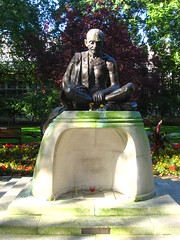 |
| Cilip office in Bloomsbury, London |
On September 15, Cilip (the UK Chartered Institute of Library and Information Professionals) and OCLC held a meeting on the challenge that mobile technology proves for libraries, called Becoming upwardly mobile Executive Briefing.
The attendees came from the British Isles (UK and Ireland). Some of the speakers however came from elsewhere. Representing The Netherlands, I presented the UBA Mobiel project as a case study, which went well.
The mere fact that I was asked to present our small low-key project - which in the end cost less than 1100 euro and 200 hours - as a case study along the new public library in Birmingham with a budget of 179 million pounds sterling shows how diverse the subject 'the mobile challenge' is.
Thus the talks varied widely, and especially the panel discussion suffered from a lack of focus. It was interesting nevertheless.
Attendees were encouraged to turn their mobiles on and tweet away, and a fair number of them did. See Twitter archive for #mobexec at twapperkeeper.
1. Adam Blackwood, JISC RSC
A nice wide-ranging introduction in a pleasant presentation, using lots of lego animation. In one word: convergence. To show what a modern smartphone can do, he emptied his pockets, then went on from a big backpack, until the table in front of him was covered with equipment, a medical reference, an atlas and so on. "And one more thing…". The versatility of the devices coming at us means not only that current practices will be replaced, but also that they are going to merge in unexpected ways. Reading a textbook online is a different experience from reading it on paper, for instance. Augmented reality (in the broad sense of the word, not just the futuristic goggles) is a huge enabler that we should not block by sticking to old rules (such as asking to turn devices off in the library or during lectures).
As for the demoes, it's a bit unfortunate that it always seem to be the same that are pointed to (NCSU, DoK), though they're still great. Using widgetbox to quickly create mobile websites was new to me, worth checking out further (the example was ad-enabled, hope they have a paid version, too).
All in all, a great rallying of the troops.
2. Brian Gambles, Birmingham
A talk about the new public library in Birmingham. An ambitious undertaking, inspired by amongst others the new Amsterdam public library. The new library should put Birmingham on the cultural map, and itself become one of the major touristic attractions for the city, opening in 2013. It's also meant to 'open up' the vast heritage collection (the largest collection of rare books and photography of any public library in Europe). And to pay for it, they'll have to monetize those as well.
A laudable goal, great looking plans, I wish them luck in these difficult times.
The library is not just the books (the new Kansas city library sends all the wrong messages). The mobile strategy comes forth from the general strategy: open up services and let others do the applications. Open data, etc. They are working with apple to get on iTunesU for instance (partnership with the uni). Get inspiration from cultural sector, many interesting & much downloaded apps have come from museums. Notable especially is the Street museum of London (flash-y-website, direct iTunes ap link)
Also, can't afford to hire enough cataloguers for the special collections - open up this as well, let crowdsurfing as a helpful tool. Surprised that there are people that like to correct OCR texts, which he thinks is a dreadful chore. So let's use it.
3. Panel discussion.
This wasn't as good as it could have been unfortunately, due to the wide range of the topic. Still some interesting points:
Adrian Northover-Smith from Sony of course very much pro e-ink devices and against the iPad. It's a cultural challenge for the company that their e-reader customers are female and older, most of their wares are peddled to young males. In a way, not dissimilar to libraries adjusting to the new 'digital native' generations, especially those catering to students.
Q: mobile use for people with visual impairment? A: epub format allows for more formats, larger letters, reading aloud. In some studies (art, fashion) up to 30% of students are dyslectic, and they're helped greatly by different presentation from the content. (DH: this is yet another field in which rights are the big hurdle, given the skirmishes over audiobook vs text-to-speach rights...).
Simon Bell from the British Library talked about the challenge of mass digitization. The definition of availability is shifting, and digital born data is especially volatile. Mobile access is just another form of presenting content, the content comes first now.
Jonathan Glasspool from Bloomsbury Academic talked about the publishing point of view. He presented a new platform for online publishing, using CC licenses to allow non-commercial use online. I'm curious how this compares to the European OApen project in which our uni participates.
In his view, the main challenge today is that the industry needs a new type of people. Bloomsbury has weekly voluntary 'elevenses' sessions, where staff can brief each other on new ideas and online uses they found, which seem to work well as a motivator.
Simon Bains and bevanpaul noted via tweets that there seems to be a big divide between those focussing on generating content versus those interested in new platforms, and I agree. You can't have one without the other, it's a chicken & egg situation. On the other hand, the reality is that the size of the problems are so big that to get anything done, focus is needed.
Brian Gambles mentioned that railway ticket machines were recently redesigned to deal with the visual impaired, resulting in a design that's much better for everyone. Better to incorporate it from the start: "accessibility should be in the DNA of new products".
4. Jeff Penka, OCLC worldwide
As I was preparing for my own talk, only a few notes. The main point of technology is barrier elimination for the user. We tend to think in systems, in details, jargon and acronyms: ILS, OPAC, SFX. The user just thinks a button should be "Get it". See also the importance of 'one-click' shopping in the Amazon and iTunes stores: such a seemingly small step key to dominance.
The worldcat mobile interface is very 'beta' - every 2-3 days a new release, to try things out. Expected to stabilize in spring 2011 though. An interesting remark: OCLC believes that a mobile interface should not come as an extra, at a high cost. Rimshot! Too many vendors are trying to squeeze their clients by doing exactly that.
5. Driek Heesakkers on Uba Mobiel
Download the presentation (licensed under creative commons BY-NC-SA).
Then it was my turn. I presented our small 'agile' project. See the presentation. It will be described in more detail in the upcoming book 'Catalogue 2.0' - A little ironic, as one of the themes of the day was that the catalogue is much less important to the users as it is to library professionals.
To summarize: by giving space to enthusiastic early adopters amongst staff, in the form of a low-overhead, fast-moving project that focuses on possible quick wins, a library can bridge the gap for the current transition period. In the long term, vendors will come up with solutions that present content (whether a catalogue, website or digitized objects) equally well in a mobile content as in others. This will take a while though, and in the meanwhile we can't afford that our services are (nearly) unusable on a mobile device.
Basically, the message is "just do it" - it will be easier than you think!
6. Benoit Maison on Pic2shop
A highly specialized topic. The pic2shop application offers an interesting way of merging functionality that web apps can't access (in this case, barcode scanning) with regular web apps. In the case of their worldcat enabled scanner, a user can scan a book (in a bookstore I presume), the app then passes the code on to an external website which does something useful with it (looks it up in worldcat) and the app displays the result from this website inside the app interface. To the user it's transparant, for the developer it's relatively light-weight.
It's an elegant concept. Might be useful for other specific device functionality that can't be accessed via web apps as well, though there are currently no plans for that.
The day ended with a session on augmented reality by Lester Madden, who did a good job I heard. Unfortunately my flight connection was too tight to stay for this one. The flight experience was pretty bad anyway... next time Eurostar for me!
Finally, for a little balance: on the same day, Aaron Tay wrote A few heretical thoughts about library, which deals amongst other things with the relative unimportance of mobile use at the moment. To a certain extent he has a point. It's not bad to stop for a moment and check if you're just following the pack.


No comments:
Post a Comment